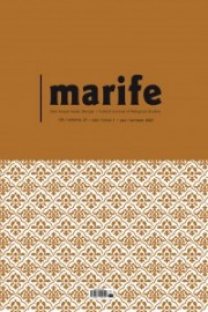“MEN KEZEBE ALEYYE...” HADİSİ VE LÂFZEN MÜTEVATİR MESELESİ
“رﺎﱠﻨﻟا ْﻦِﻣ ُﻩَﺪَﻌْﻘَﻣ ْأﱠﻮَـﺒَﺘَﻴْﻠَـﻓ اًﺪﱢﻤَﻌَـﺘُﻣ ﱠﻲَﻠَﻋ َبَﺬَﻛ ْﻦَﻣ/Kim benim adıma kasten yalan söylerse cehennemdeki yerine hazırlansın” hadisi çeşitli ilim dallarına mensup ilahiyatçılar tarafından en çok bilinen hadislerden biridir. Söz konusu hadisin yaygın olarak tanınmasında, diğer hadislerden farklı olarak, onun lâfzî mütevâtir kabul edilmesi ve bu konuda nispeten bir fikir birliğinin bulunması önemli bir yere sahiptir. Bununla birlikte, temel hadis kaynaklarında söz konusu hadisin muhtelif lafızlarla nakledilmesi de dikkat çekici bir olgudur. “... ﱠﻲَﻠَﻋ َبَﺬَﻛ ْﻦَﻣ” hadisi bir yandan, temel kaynaklarda farklı lafızlarla nakledilirken, diğer yandan lâfzen mütevâtir sayılması dikkat çekmektedir. Bu makalede, lâfzî mütevâtir kavramı teorik olarak incelendikten sonra lafızları açısından “... ﱠﻲَﻠَﻋ َبَﺬَﻛ ْﻦَﻣ” hadisinin rivâyet seyrini araştırılacaktır. Ayrıca, yaygın olarak bilinenin aksine, söz konusu hadisin rivâyet edilen sahabîlerden aynı lafızla gelmediği, hatta çoğu kere, bir sahabînin muhtelif râvîlerinden farklı lafızlar nakledildiği vurgulanacaktır
THE HADITH OF “MAN KADHABA ‘ALAYYA…” AND ISSUE OF MUTAWATIR LITERALLY
The hadith “Man kadhaba ‘alayya…” is one of the most famous hadiths of the Prophet Muhammed among the academicians of Islamic disciplines. One of the most important reasons for its fame comes from a consensus that almost all scholars of hadith considered it as a ‘mutawatir literally’ hadith. However, this hadith takes place in classical hadith sources in a number of different accounts by different narrators. Thus, there must be a reason why scholars considered this hadith as a ‘mutawatir literally’ in spite of the fact that it is related in different wordings by different narrators. In this article, the process of narration of the hadith in question will be investigated critically after an analytical study of the meaning of the term ‘mutawatir literally’ from theoretical point of view within the context of the science of usul alhadith. It is emphasized in this article that in contrary to the common belief that this hadith is narrated with same wordings from the Companions of the Prophet, most of the times, it is narrated in different wordings by different narrators from a single Companion.
